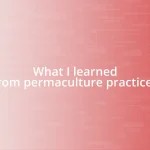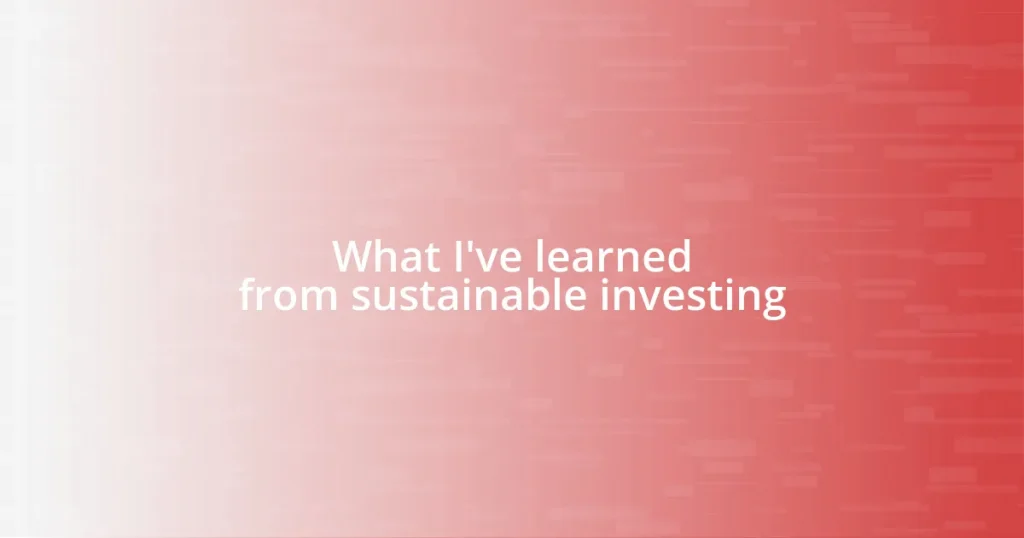Key takeaways:
- A plant-based diet encompasses a wide variety of foods, emphasizing fruits, vegetables, legumes, nuts, and whole grains.
- Adopting a plant-based diet can lead to improved energy levels, better digestion, heart health, and a greater awareness of food’s environmental impact.
- Gradual changes, meal planning, and incorporating new recipes are effective strategies for transitioning to a plant-based lifestyle.
- Building a supportive community and tracking personal progress can help maintain motivation during the dietary shift.

Understanding the plant-based diet
A plant-based diet primarily focuses on consuming foods derived from plants, which includes not only fruits and vegetables but also nuts, seeds, oils, whole grains, legumes, and beans. I remember the first time I explored this diet; it felt almost like stepping into a vibrant farmer’s market where everything was fresh and alive. The color and variety were not just visually appealing; there was an unmistakable energy that made me genuinely excited about my meals.
Initially, I thought that going plant-based meant giving up my favorite foods. But as I dug deeper, I discovered a world of alternatives and creative recipes that transformed my perceptions. Have you ever tried making a plant-based version of your favorite dish? I vividly recall substituting lentils for minced meat in my beloved spaghetti bolognese. The satisfaction of finding flavors I adored in a new format was both thrilling and fulfilling.
Furthermore, embracing this diet offers profound emotional and ethical implications. It wasn’t just about personal health; it was about making more compassionate choices. When I learned about the environmental impact of animal agriculture, I felt a sense of responsibility. It made me wonder: what kind of legacy do I want to leave for future generations? For me, choosing a plant-based diet became part of a larger journey toward sustainability and mindfulness.

Benefits of a plant-based diet
One of the most striking benefits I’ve experienced from adopting a plant-based diet has been the boost in my overall energy levels. I remember the first couple of weeks—I felt lighter, both physically and mentally. Instead of that sluggish feeling after a meal, I found myself more alert and ready to tackle the day. It was as if my body had finally shed some unnecessary weight, and the increase in fruits and vegetables really made a difference.
Here are some key benefits I’ve noticed:
- Improved digestion: The fiber from plant foods keeps things moving smoothly.
- Weight management: I found it easier to maintain a healthy weight without feeling deprived.
- Heart health: Increasing my intake of whole foods contributed to lower cholesterol levels.
- Enhanced mood: I truly felt happier; food choices can elevate our spirits.
- Environmental impact: I felt proud knowing my choices contributed to a more sustainable planet.
Switching to a plant-based diet has more than just physical benefits; it has also deepened my connection to the food I consume. Each meal feels like a celebration of nature’s bounty, and I love grilling seasonal vegetables or preparing hearty bean stews that warmth my home. With every bite, day by day, I embrace this lifestyle and see the growth—both in my health and my awareness of where my food comes from.

Assessing your current diet
Assessing your current diet is an essential step in transitioning to a plant-based lifestyle. I found it helpful to keep a food diary for a week, recording everything I ate. Initially, I was surprised by how often I reached for processed foods and snacks. It was eye-opening to see the patterns, and honestly, it made me a bit uncomfortable. But that discomfort was a catalyst for change, guiding me to become more mindful about the foods I chose.
As I reflected on my diet, I evaluated not just what I consumed, but also why I chose those foods. I realized that a lot of my meals were deeply rooted in convenience or habit rather than necessity. One afternoon, while browsing my snack options, I asked myself: “Are these truly satisfying me, or am I just filling a void?” This self-questioning transformed my perception about food and motivated me to explore healthier alternatives.
To help with this self-assessment, I put together a simple comparison table highlighting the differences between my previous dietary habits and my goals for a plant-based diet. This piece of visual feedback has been instrumental in my journey, serving as both a reminder and a motivational tool.
| Current Dietary Habits | Plant-Based Goals |
|---|---|
| High processed foods | Whole, unprocessed foods |
| Minimal fruits and vegetables | Varied fruits and vegetables daily |
| Limited protein sources | Increased variety of plant proteins |

Making gradual changes
Making gradual changes has been a transformative part of my journey. I vividly recall that first month when I decided to swap one meat-based meal for a plant-based option each week. I started with my favorite comfort food, chili. Swapping ground beef for lentils felt like a game changer! Not only did the dish taste amazing, but my energy levels soared afterward, sparking curiosity about what else I could try.
As I navigated the world of plant-based eating, I embraced the idea that small steps can lead to significant change. I remember standing in the produce aisle, overwhelmed by the colorful array of fruits and vegetables, and thinking, “What if I tried one new ingredient each week?” This approach made the transition enjoyable instead of daunting. I was surprised at how much I looked forward to discovering new recipes and flavors; it ignited a sense of adventure in my cooking.
I also found that reflecting on my changes helped reinforce my commitment. After a few weeks, I noticed my cravings changing. I asked myself, “Why was I suddenly reaching for apples instead of chips?” It dawned on me that my palate was adjusting, and with each small victory, I felt a deep sense of accomplishment. Celebrating these moments—even just acknowledging how good I felt—made the gradual shift to plant-based living not just a diet, but a lifestyle choice that resonated with my values and my body.

Tips for meal planning
Meal planning is crucial for anyone transitioning to a plant-based diet. I use themed days to simplify my week, like “Meatless Monday” or “Whole Grain Wednesday.” By assigning themes, I create a game plan that guides my grocery list and eliminates the guesswork during busy weekdays. I remember once realizing that having a clear structure not only made shopping easier but also reduced food waste, as I was no longer buying on impulse.
Another tip that has transformed my approach is batch cooking. On Sundays, I dedicate a few hours to preparing meals that can be easily reheated throughout the week. I often make big pots of soup or stew, full of various vegetables and lentils. It’s comforting to know that I’ve got wholesome food ready to go. Plus, I take that time to experiment with new recipes, which endlessly enriches my cooking repertoire and keeps things fresh and exciting.
Finally, don’t underestimate the power of variety. When I first started meal planning, I defaulted to the same few recipes over and over. It became a bit boring, honestly. So now, I challenge myself to explore at least one new recipe each week. Ask yourself: “What can I try this week that will ignite my taste buds?” You’d be amazed at the hidden gems you might discover! Each new dish not only keeps my meals exciting but also helps me stay committed by reminding me of how delicious and versatile plant-based eating can be.

Common challenges and solutions
Transitioning to a plant-based diet comes with its set of challenges, and one that I didn’t expect was the social aspect. Imagine going to a party where the hors d’oeuvres are primarily meat-based. I felt a pang of anxiety as I navigated the snack table, wishing I had brought a dish to share. To tackle this, I started bringing my own plant-based appetizers, which not only kept me satisfied but also sparked conversations about the benefits of plant-based eating. It was rewarding to see others curious about my choices!
Another hurdle I faced was the perception that plant-based meals lack protein. I used to feel anxious about getting enough, especially coming from a background that emphasized protein-rich diets. However, I explored alternatives like quinoa, chickpeas, and tofu. These foods made me realize that protein can be both diverse and delicious! One evening, while preparing a chickpea salad, I thought, “Who knew healthy eating could be so satisfying?” That realization boosted my confidence and made me a more adventurous cook.
Lastly, I struggled with cravings for my old favorites. The first time I encountered a strong urge for pizza, I found myself torn. Instead of giving in, I decided to recreate it using a cauliflower crust topped with vibrant vegetables and nutritional yeast for a cheesy flavor. I remember taking that first bite and feeling delighted—this was a treat I could enjoy without guilt! Finding ways to make over my comfort foods not only quenched my cravings but also reflected my commitment to my new lifestyle. Isn’t it freeing to know we can still indulge our cravings while embracing healthier choices?

Maintaining motivation and support
Staying motivated on my journey toward a plant-based diet has been all about building a supportive community around me. I found that connecting with like-minded individuals not only provided inspiration but also accountability. Whether it was joining an online forum or attending local meet-ups, sharing experiences and recipes truly made a difference. Have you ever felt energised after talking to someone who shares your passions? That’s exactly how I felt, and it reinforced my commitment to this lifestyle.
Another powerful motivator has been tracking my progress. I started keeping a journal—not just to document what I ate, but to reflect on how I felt. I recall one week when I noticed a significant boost in my energy levels and a clearer mind after ditching processed foods. Realizing these physical benefits kept me going, especially on days when I felt tempted by unhealthy choices. It’s amazing how our bodies can respond positively when we nourish them with whole foods!
Lastly, I’ve learned the importance of celebrating small victories. Maybe it’s cooking a tasty new recipe or simply choosing a plant-based meal when dining out—each step deserves recognition. I remember the first time my family actually enjoyed a plant-based dish I made, and their compliments filled me with joy. Do you celebrate your milestones? Recognizing these achievements not only reinforces my motivation but also makes the journey much more fulfilling. After all, every small win is a step closer to embracing this healthier lifestyle!















